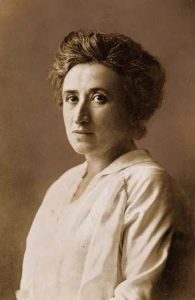I believe that a very significant part of World War I was the use of chemical weapons in April 1915 because it was a new technology that we still see being used today. Mustard gas was developed by a German scientist names Fritz Harber. His idea was not accepted at first, but eventually, a general decided to try it, and it proved to be effective with 1,100 deaths. I believe that this is significant because it set the basis for future chemical technologies that have been used in World War II and later in Vietnam and other wars.
Something else I find very important and noteworthy is the revolutionary movement carried by Rosa Luxembourg in 1914. She was against the act of soldiers blindly agreeing to fight for their governments and went as far as labeling it as torture. She was arrested for this but had over a thousand witnesses ready to support her, and she claimed that she had even more. I find this meaningful because it is a very relevant example of a citizen publicly rebelling against the government. This motivated many more forms of resistance later in the war. It serves as an early example of what we see very often today, although under different freedom of speech regulations.
“Luxemburg, Rosa”. Photo. Encyclopædia Britannica Online. Web. 04 Oct. 2017. <https://www.britannica.com/biography/Rosa-Luxemburg?oasmId=200132>

Hello Tidiane,
I enjoyed reading your blog post. I found it to be very informative as I personally never knew the history of Mustard Gas and how it helped advance modern day chemical warfare. Furthermore, Rosa Luxembourg was seen as a modern ‘rebel’ and can be seen as a symbol of hope and uprising against a corrupt government. Brilliantly written.
Good Job T!
Hi Tidiane,
This was a well written blog post which raised points that I had never really thought about, which was refreshing. Your paragraph on Rosa Luxembourg was of interest to me as it is similar to what I talked about for my blog post, and I think you did a very good job on it. However, I do think that you could expand your point on the use of mustard gas in the First World War. For example, elaborating on whether you think that the use of mustard gas could’ve been indicative to the development of technology at the time or if the use of mustard gas was a sign of the brutal nature of combat in WW1. These are just points that come to mind, but your blog post was nice to read and still interesting nonetheless.
Tidiane,
The varied choices in this entry show breadth of knowledge, and I encourage you to keep it up. You may also want to consider more depth, for example, readers might not know which country’s military Ms. Luxembourg stood against, and the specific issues for which she fought. Further connections to specific examples of modern resistance movements or uses of chemical warfare would also demonstrate understanding of historical significance.